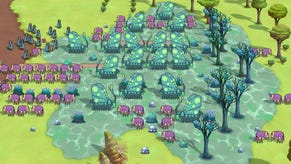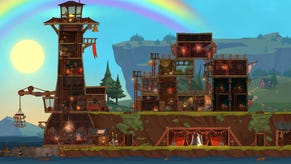Gaming Made Me: The Hitchhiker's Guide
10 years ago this week, the great British author and dramatist Douglas Adams passed away suddenly at the age of just 49 - leaving behind a wealth of fiction, scripts, essays, humour and remarkable insight into the role of technology and the internet. Of course, it was the Hitchhiker's Guide To The Galaxy, a revered sci-fi comedy series which spanned radio, novels and video games, for which he will always be most renowned.
Here, Victoria Regan looks back to Adams' seminal 1984 Hitchhiker's text adventure game - a monochrome tale of the everyman, intergalactic absurdity and the bewildering cruelty of life.
The Mac took pride of place on the leather-topped desk in my Dad’s study, its blocky casing a fetching shade of beige which my brother would later christen ‘old man’s vest’. It was tall, with a tiny screen, and my Dad was acquiring an ever-expanding selection of games to play on it. His study was a mess of papers and books, records and cassettes, with disks on every surface in slithering piles that my brother and I would rummage through to find the game we wanted. Insert the disk. Wait impatiently for it to load. Suddenly the screen would go white, save for a few lines of text. Flashy and immediate it wasn’t.
It was here I learnt of the quiet heroism of Arthur Dent, who didn’t receive the notice about the forthcoming demolition of his home and found nothing of use within his dressing gown pockets except for a buffered analgesic. His willingness to lie down in the path of an oncoming bulldozer showed courage in the face of randomness, and randomness struck me then as what this game was all about, as I was sidelined from the action over and over by a smart-tongued aside.
Poor Arthur died countless times as I attempted to breach the fortress of vexing statements and clever words that I wasn’t yet old enough to understand, although I caught the tone and was intrigued. This was my first introduction to the work of Douglas Adams, in all its irreverent glory.
The Hitchhiker’s game left me curious and perplexed in equal measure. Why wasn’t my Dad any better at extracting progress from the game than I was? Or my older brother? The game was truly difficult. You would play for a few hours, learning by trial and error what the correct responses were to get you past the earliest hurdles, actually not getting very far at all. ‘Did you get onto the space ship?’ I’d ask my brother when he played, eager to hear news of what else the game had up its sleeve that I’d been unable to access but was keen to see. The urge to find out what was hidden was what I remember best, because this journey would be a fascinating, ever-unpredictable one; you could just tell.
We played again and again, challenged by the difficulty and drawn in by the clever words and brilliant mix of the humdrum and the fantastic. Hitchhiker’s made alien life seem as unexpected yet deeply predictable as our own, with its tribalism, rules and regulations and politics. Hazards such as being wiped out in a casual act of intergalactic roadhogging were presented with a world-weary shrug, as if it was all to be expected in the course of Arthur Dent’s very bad day. The game’s nonchalant tone was the core of its appeal to me, making me realise that stories in which noble heroes struggled to vanquish evil could be extremely banal, their very earnestness wiping out the scope for humour that Hitchhiker’s displayed.
Sometimes my brother and I would play the game together, with me sitting in the chair typing, whilst he leaned in to look at the screen, often walking gingerly around the book-strewn study floor with his hands crossed on top of his head as if to apply a thinking cap. We would invariably disagree about what response to type, get it wrong, or on the rare occasions we made some progress I would forget to save the game and we’d be back to the beginning again. The frustration was all part of the fun somehow, like my brother’s favourite toy of that time, the Rubik’s Magic. We were absorbed by Hitchhiker’s peculiar rewards because they were so very hard to attain.
Our family had a love affair with Macs, upgrading through every new model since the first one came out in 1984, so it seemed fitting to play a game developed by Adams, one of the first Mac owners in the UK. At my junior school, computing lessons consisted of typing lengthy code into a BBC computer that would, if successful, result in a full-screen picture of an owl made out of noughts and crosses when you pressed ‘Enter’. This lameness made the Mac games I played at home seem even more impressive and although other titles we had were easier and perhaps even more fun than Hitchhiker’s, that was the whole point; other games seemed dumb in comparison.
Douglas Adams was famous for his inability to meet a deadline, and with the Hitchhiker’s game perhaps he found a clever way of turning his problems with writing back onto his fans, presenting them with the empty page that every writer fears. Like mining a creative but cantankerous brain, it was up to you to winkle out the game hidden beneath, for Hitchhiker’s was sophisticated and self-confident enough to present its players with nothing but an empty screen with the briefest of phrases to get you started.
Like a club so exclusive that it has no need for a sign, the Hitchhiker’s game didn’t much care if you couldn’t get in, and affected an air of amused indifference to the fate of both protagonist and player. Too cool to be flashy or try-hard, it simply rolled its eyes at you and seemed to wonder when a more intelligent player was going to come along. ‘You keep out of this, you’re dead and should be concentrating on developing a good firm rigor mortis’ it would quip at you as you led Arthur Dent to another early demise at the hands of a bulldozer and a flying brick.
Arthur is a hapless foil for the events that are swinging his way, an everyman figure who only dimly remembers what he might have said in the pub the night before or indeed why he might have a hangover. You couldn’t help admiring his stoical response to a sea of surprising events, and in this respect playing Hitchhiker’s was a great preparation for adult life, in all its glorious muddle and confusion. Whilst Douglas Adams’ early death was a sad reminder of the randomness of life, the ultimate unfairness of it all, Hitchhiker’s gives us the enduring chance to admire his mischievous and original mind at play.
The Hitchhiker's Guide To The Galaxy can be played in your browser for free in its original version here, or as a modernised version with artwork here.













